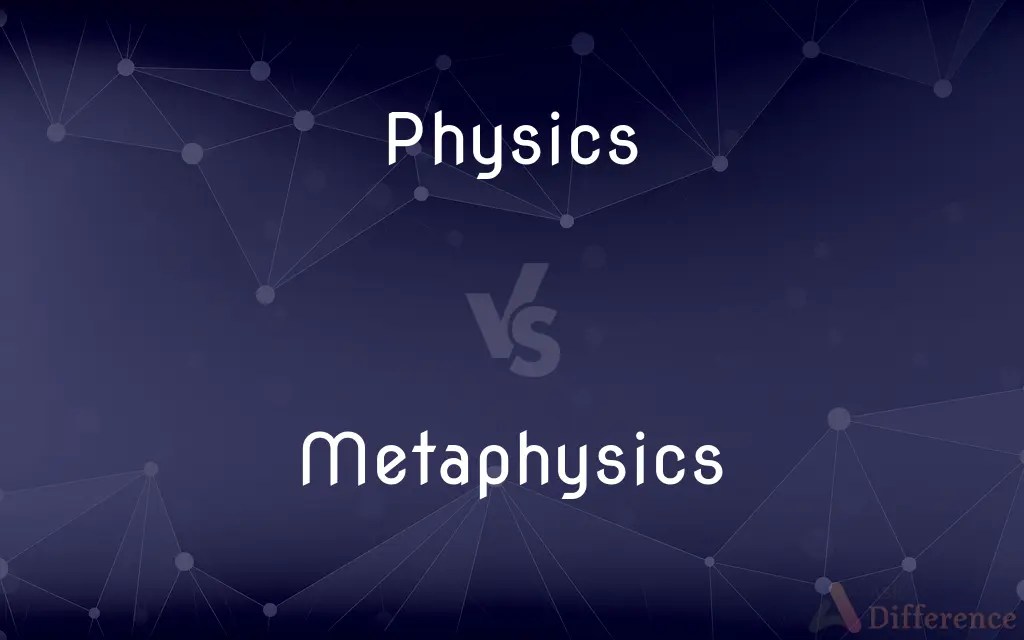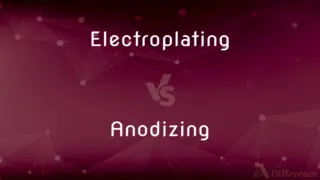Physics vs. Metaphysics — What's the Difference?
By Tayyaba Rehman — Updated on October 13, 2023
Physics studies the fundamental principles of the universe, its properties, and behavior, while Metaphysics explores beyond the physical realm, focusing on the nature of reality, existence, and the supernatural.

Difference Between Physics and Metaphysics
Table of Contents
ADVERTISEMENT
Key Differences
Physics and Metaphysics, while both delve into understanding existence, differ in their approaches and areas of focus. Physics is a branch of science that investigates the properties, behavior, and structure of matter, energy, space, and time. It relies heavily on empirical evidence, experiments, and mathematical formulations. On the other hand, Metaphysics delves into questions about existence, reality, and the nature of the universe that can't be answered through empirical means.
Continuing with Physics, it has led to groundbreaking discoveries that have shaped our understanding of the universe. From Newton's laws of motion to Einstein's theory of relativity, Physics provides explanations for observable phenomena, grounding them in testable hypotheses and rigorous experimentation. Metaphysics, in contrast, asks broader, more philosophical questions. It's concerned with understanding the nature of being, the essence of things, causality, and the existence or non-existence of a higher power or supernatural entities.
While Physics operates within a framework of established laws and theories, and seeks to discover new ones through methodical testing, Metaphysics often ventures into abstract thought and philosophical discourse. This makes Metaphysics speculative in nature. For instance, Physics can explain the mechanics of a star's life cycle, while Metaphysics questions why stars, or anything at all, exist in the first place.
In modern discussions, Physics often intersects with technology, leading to innovations and advancements in fields like electronics, aerospace, and medicine. Metaphysics, however, frequently intertwines with ethics, theology, and other philosophical domains, examining the deeper, intangible aspects of existence and consciousness.
Comparison Chart
Primary Focus
Properties and behavior of matter and energy
Nature of reality and existence
ADVERTISEMENT
Methodology
Empirical, experimental
Speculative, philosophical
Domains
Mechanics, Thermodynamics, Quantum Mechanics, etc.
Ontology, Cosmology, Theology, etc.
Key Questions
How? Why based on physical laws?
Why in terms of existence? What is the nature of being?
Intersection with
Technology, Engineering
Ethics, Theology, Philosophy
Compare with Definitions
Physics
The study of matter, energy, and their interactions.
Physics provides insights into the working of the universe.
Metaphysics
The philosophical study of the nature of existence and reality.
Metaphysics often delves into questions about the meaning of life.
Physics
Analysis of forces, motion, and the fundamental particles of nature.
Physics lessons often begin with an introduction to Newton's laws of motion.
Metaphysics
Examination of the fundamental nature of being and the world.
Metaphysics seeks to understand the essence of things.
Physics
A science dealing with the properties, changes, and interactions of continuous matter.
Physics has given rise to many technological advancements.
Metaphysics
Inquiry into the first principles and causes of things.
The cause and purpose of the universe is a metaphysical question.
Physics
Investigation of natural phenomena through observation and experimentation.
Quantum physics delves into the behavior of particles at the smallest scales.
Metaphysics
Exploration of concepts beyond the physical realm.
Discussions on the soul and afterlife are topics in metaphysics.
Physics
Physics (from Ancient Greek: φυσική (ἐπιστήμη), romanized: physikḗ (epistḗmē), lit. 'knowledge of nature', from φύσις phýsis 'nature') is the natural science that studies matter, its motion and behavior through space and time, and the related entities of energy and force. Physics is one of the most fundamental scientific disciplines, and its main goal is to understand how the universe behaves.Physics is one of the oldest academic disciplines and, through its inclusion of astronomy, perhaps the oldest.
Metaphysics
Metaphysics is the branch of philosophy that studies the first principles of being, identity and change, space and time, causality, necessity and possibility. It includes questions about the nature of consciousness and the relationship between mind and matter.
Physics
(used with a sing. verb) The science of matter and energy and of interactions between the two, grouped in traditional fields such as acoustics, optics, mechanics, thermodynamics, and electromagnetism, as well as in modern extensions including quantum mechanics, relativity theory, cryogenics, solid-state physics, particle physics, and plasma physics.
Metaphysics
(used with a sing. verb) Philosophy The branch of philosophy that examines the nature of reality, including the relationship between mind and matter, substance and attribute, possibility and actuality.
Physics
(used with a pl. verb) Physical properties, interactions, processes, or laws
The physics of supersonic flight.
Metaphysics
(used with a pl. verb) The theoretical or first principles of a particular discipline
The metaphysics of law.
Physics
(used with a sing. verb) Archaic The study of the natural or material world and phenomena; natural philosophy.
Metaphysics
(used with a sing. verb) A priori speculation upon questions that are unanswerable to scientific observation, analysis, or experiment.
Physics
The branch of science concerned with the study of the properties and interactions of space, time, matter and energy.
Newtonian physics was extended by Einstein to explain the effects of travelling near the speed of light; quantum physics extends it to account for the behaviour of atoms.
Metaphysics
(used with a sing. verb) Excessively subtle or recondite reasoning.
Physics
The physical aspects of a phenomenon or a system, especially those studied scientifically.
The physics of car crashes would not let Tom Cruise walk away like that.
Metaphysics
The branch of philosophy which studies fundamental principles intended to describe or explain all that is, and which are not themselves explained by anything more fundamental; the study of first principles; the study of being insofar as it is being (Latin: ens in quantum ens).
Philosophers sometimes say that metaphysics is the study of the ultimate nature of the universe.
Physics
Plural of physic
Metaphysics
The view or theory of a particular philosopher or school of thinkers concerning the first principles which describe or explain all that is.
The metaphysics of Thomas Aquinas holds that all real beings have both essence and existence.
In Aristotelian metaphysics physical objects have both form and matter.
In his Pensées, Pascal mentioned some first principles recognized within his metaphysics: space, time, motion, and number.
Physics
The science of nature, or of natural objects; that branch of science which treats of the laws and properties of matter, and the forces acting upon it; especially, that department of natural science which treats of the causes (as gravitation, heat, light, magnetism, electricity, etc.) that modify the general properties of bodies; natural philosophy.
Metaphysics
The metalogic of physics; the logical framework of physics.
Even other universes should be a result of different physics. Without rules, these universes wouldn't exist, because they will have an undefined, thus impossible, nature. We will never understand or guess all possible forms of physics. That's why we have to understand the generic metaphysics.
Physics
The science of matter and energy and their interactions
Metaphysics
Any fundamental principles or rules.
Physics
Examination of the fundamental principles governing the universe.
The laws of physics remain consistent across diverse scenarios.
Metaphysics
(uncountable) The study of a supersensual realm or of phenomena which transcend the physical world.
I have a collection of books on metaphysics, covering astral projection, reincarnation, and communication with spirits.
Metaphysics
Displeasingly abstruse, complex material on any subject.
This political polemic strikes me as a protracted piece of overwrought, fog-shrouded metaphysics!
Metaphysics
Plural of metaphysic
Metaphysics
The science of real as distinguished from phenomenal being; ontology; also, the science of being, with reference to its abstract and universal conditions, as distinguished from the science of determined or concrete being; the science of the conceptions and relations which are necessarily implied as true of every kind of being; philosophy in general; first principles, or the science of first principles.
Commonly, in the schools, called metaphysics, as being part of the philosophy of Aristotle, which hath that for title; but it is in another sense: for there it signifieth as much as "books written or placed after his natural philosophy." But the schools take them for "books of supernatural philosophy;" for the word metaphysic will bear both these senses.
Now the science conversant about all such inferences of unknown being from its known manifestations, is called ontology, or metaphysics proper.
Metaphysics are [is] the science which determines what can and what can not be known of being, and the laws of being, a priori.
Metaphysics
The scientific knowledge of mental phenomena; mental philosophy; psychology.
Metaphysics, in whatever latitude the term be taken, is a science or complement of sciences exclusively occupied with mind.
Whether, after all,A larger metaphysics might not helpOur physics.
Metaphysics
The philosophical study of being and knowing
Metaphysics
Philosophical study of what exists and its nature and essence.
Debates on free will versus determinism fall under metaphysics.
Common Curiosities
Why is Metaphysics important?
It addresses fundamental questions about existence, purpose, and the nature of reality.
Does Metaphysics have any empirical evidence?
Typically, metaphysical concepts aren't empirically testable, relying more on philosophical reasoning.
How has Physics impacted our daily lives?
Physics is foundational to technology, electronics, transportation, medicine, and more.
Are Physics and Metaphysics opposing fields?
No, they address different aspects of understanding; Physics focuses on the physical realm, while Metaphysics delves into abstract concepts.
Does Metaphysics believe in a higher power?
Metaphysics explores the concept, but doesn't inherently affirm or deny it.
Can a physicist also study Metaphysics?
Absolutely, many scientists have also been deeply philosophical.
Can Metaphysics be scientifically proven?
By nature, many metaphysical concepts are beyond empirical testing.
What's a famous paradox in Metaphysics?
The "ship of Theseus" paradox, questioning identity and change.
Are the laws of Physics constant?
Currently, known physical laws appear consistent, but research continues.
Do Physics and Metaphysics ever overlap?
On topics like the origin of the universe, they might intersect in discussion.
What are some subfields of Physics?
Thermodynamics, electromagnetism, and relativity, to name a few.
Is string theory in the domain of Physics or Metaphysics?
While string theory is a physical theory, some of its untestable aspects may border on metaphysical.
Why is Physics considered a foundational science?
It studies the basic laws and principles governing the universe.
Can Metaphysics answer all philosophical questions?
Metaphysics tackles profound questions, but some may remain unanswered or subjective.
Are quantum mechanics and metaphysics related?
Quantum mechanics is a branch of physics, but its mysterious nature often leads to metaphysical discussions.
Share Your Discovery

Previous Comparison
Electroplating vs. Anodizing
Next Comparison
Bolus vs. ChymeAuthor Spotlight
Written by
Tayyaba RehmanTayyaba Rehman is a distinguished writer, currently serving as a primary contributor to askdifference.com. As a researcher in semantics and etymology, Tayyaba's passion for the complexity of languages and their distinctions has found a perfect home on the platform. Tayyaba delves into the intricacies of language, distinguishing between commonly confused words and phrases, thereby providing clarity for readers worldwide.















































